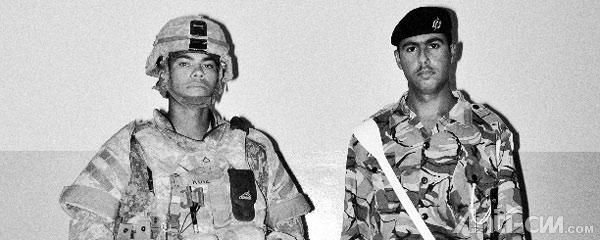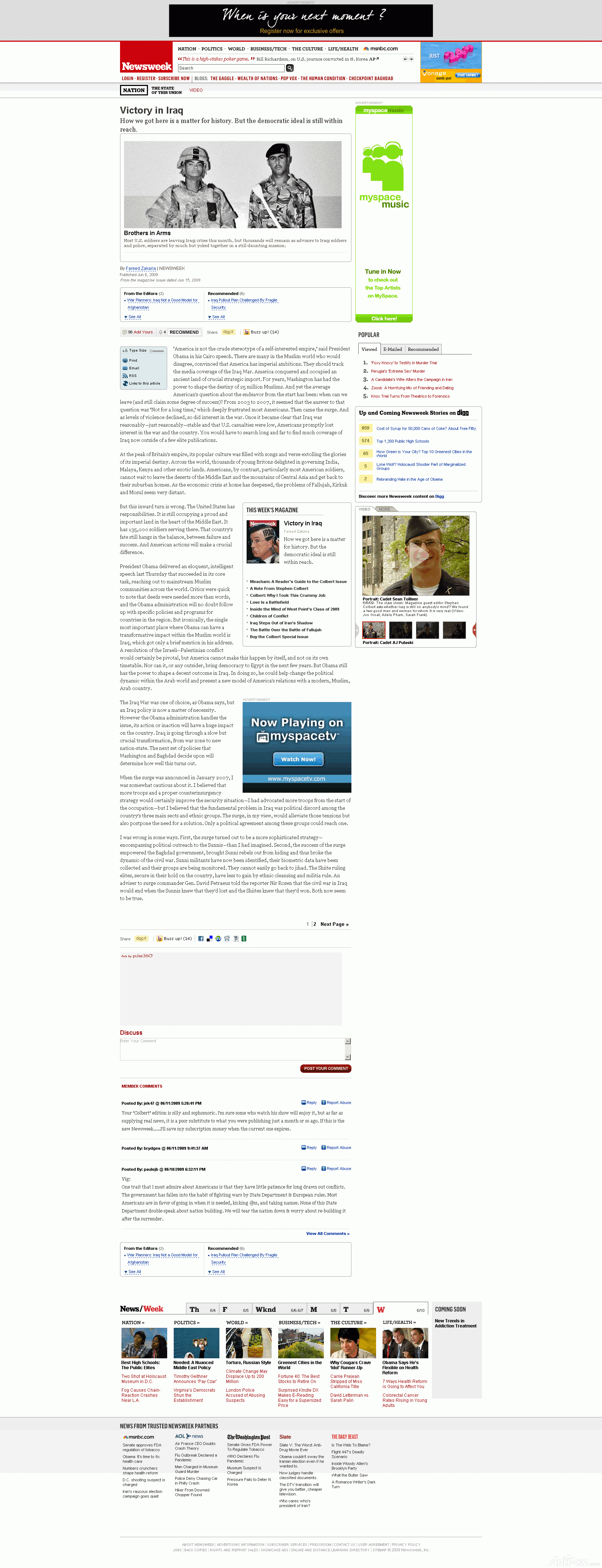|
|
本帖最后由 I'm_zhcn 于 2009-6-15 17:32 编辑
Victory in Iraq
http://www.newsweek.com/id/200858
By Fareed Zakaria Published Jun 6, 2009 From the magazine issue dated Jun 15, 2009
How we got here is a matter for history. But the democratic ideal is still within reach.

Brothers in Arms
Most U.S. soldiers are leaving Iraqi cities this month, but thousands will remain as advisors to Iraqi soldiers and police, separated by much but yoked together in a still-daunting mission.
"America is not the crude stereotype of a self-interested empire," said President Obama in his Cairo speech. There are many in the Muslim world who would disagree, convinced that America has imperial ambitions. They should track the media coverage of the Iraq War. America conquered and occupied an ancient land of crucial strategic import. For years, Washington has had the power to shape the destiny of 25 million Muslims. And yet the average American's question about the endeavor from the start has been: when can we leave (and still claim some degree of success)? From 2003 to 2007, it seemed that the answer to that question was "Not for a long time," which deeply frustrated most Americans. Then came the surge. And as levels of violence declined, so did interest in the war. Once it became clear that Iraq was reasonably—just reasonably—stable and that U.S. casualties were low, Americans promptly lost interest in the war and the country. You would have to search long and far to find much coverage of Iraq now outside of a few elite publications.
At the peak of Britain's empire, its popular culture was filled with songs and verse extolling the glories of its imperial destiny. Across the world, thousands of young Britons delighted in governing India, Malaya, Kenya and other exotic lands. Americans, by contrast, particularly most American soldiers, cannot wait to leave the deserts of the Middle East and the mountains of Central Asia and get back to their suburban homes. As the economic crisis at home has deepened, the problems of Fallujah, Kirkuk and Mosul seem very distant.
But this inward turn is wrong. The United States has responsibilities. It is still occupying a proud and important land in the heart of the Middle East. It has 135,000 soldiers serving there. That country's fate still hangs in the balance, between failure and success. And American actions will make a crucial difference.
President Obama delivered an eloquent, intelligent speech last Thursday that succeeded in its core task, reaching out to mainstream Muslim communities across the world. Critics were quick to note that deeds were needed more than words, and the Obama administration will no doubt follow up with specific policies and programs for countries in the region. But ironically, the single most important place where Obama can have a transformative impact within the Muslim world is Iraq, which got only a brief mention in his address. A resolution of the Israeli--Palestinian conflict would certainly be pivotal, but America cannot make this happen by itself, and not on its own timetable. Nor can it, or any outsider, bring democracy to Egypt in the next few years. But Obama still has the power to shape a decent outcome in Iraq. In doing so, he could help change the political dynamic within the Arab world and present a new model of America's relations with a modern, Muslim, Arab country.
The Iraq War was one of choice, as Obama says, but an Iraq policy is now a matter of necessity. However the Obama administration handles the issue, its action or inaction will have a huge impact on the country. Iraq is going through a slow but crucial transformation, from war zone to new nation-state. The next set of policies that Washington and Baghdad decide upon will determine how well this turns out.
When the surge was announced in January 2007, I was somewhat cautious about it. I believed that more troops and a proper counterinsurgency strategy would certainly improve the security situation—I had advocated more troops from the start of the occupation—but I believed that the fundamental problem in Iraq was political discord among the country's three main sects and ethnic groups. The surge, in my view, would alleviate those tensions but also postpone the need for a solution. Only a political agreement among these groups could reach one.
I was wrong in some ways. First, the surge turned out to be a more sophisticated strategy—encompassing political outreach to the Sunnis—than I had imagined. Second, the success of the surge empowered the Baghdad government, brought Sunni rebels out from hiding and thus broke the dynamic of the civil war. Sunni militants have now been identified, their biometric data have been collected and their groups are being monitored. They cannot easily go back to jihad. The Shiite ruling elites, secure in their hold on the country, have less to gain by ethnic cleansing and militia rule. An adviser to surge commander Gen. David Petraeus told the reporter Nir Rosen that the civil war in Iraq would end when the Sunnis knew that they'd lost and the Shiites knew that they'd won. Both now seem to be true.

|
|